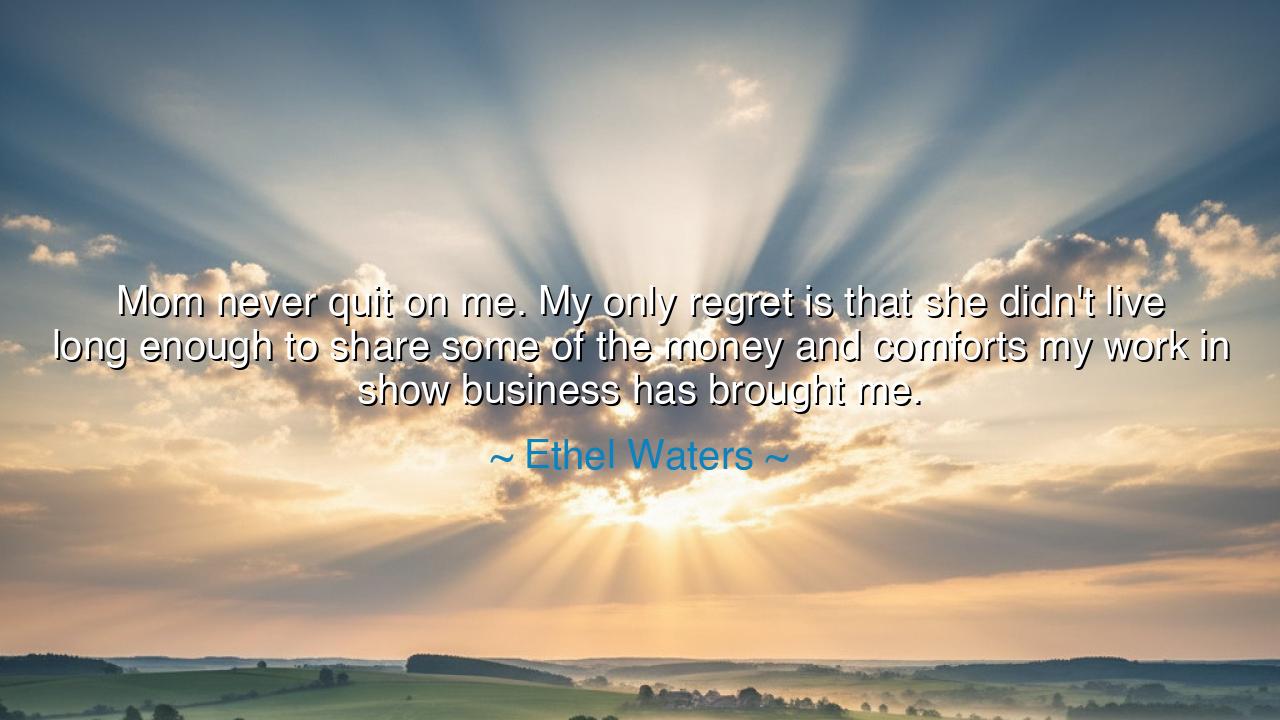
Mom never quit on me. My only regret is that she didn't live long
Mom never quit on me. My only regret is that she didn't live long enough to share some of the money and comforts my work in show business has brought me.






Hear now, O listeners of the heart, the words of Ethel Waters, the great voice of a generation, who sang through pain and triumph alike: “Mom never quit on me. My only regret is that she didn't live long enough to share some of the money and comforts my work in show business has brought me.” In these words lies a melody of love and loss, of gratitude mingled with grief. Waters, born into poverty and hardship, rose to become one of the most celebrated performers of her time—a singer and actress whose voice carried both the ache of her beginnings and the brilliance of her endurance. Yet even in success, her heart turned not toward fame, but toward the mother who had believed when no one else did.
This quote arises from the deep soil of Ethel Waters’ life—a life shaped by adversity and perseverance. Born in 1896 in Chester, Pennsylvania, to a mother who bore her at just thirteen years old, Waters knew suffering early. Her childhood was one of instability and want, yet her mother, despite her youth and hardship, never abandoned her child. When Waters found her way to the stage, when she began to sing the blues and gospel that would make her famous, it was her mother’s resilience and faith that formed the foundation of her courage. And so, in reflecting upon her mother’s passing, Waters’ words become both a thanksgiving and a lament—a recognition that love and sacrifice often come before reward, and that the ones who carry us through the storm do not always live to see us stand in the sun.
Her statement reveals a truth older than time: no triumph is truly one’s own. Behind every success lies the unseen devotion of another—a parent, a teacher, a friend—whose love sustains the dream long before it is realized. Waters’ regret that her mother could not share in her comfort is the sorrow of every child who has outlived their benefactor. It is the sorrow of one who understands that the wealth of the world cannot repay the price of unconditional love. The ancients would have called this the debt of the heart, a debt never fully paid, for it is measured not in gold or fame, but in gratitude eternal.
Consider, for a moment, the life of Abraham Lincoln, whose mother, Nancy Hanks Lincoln, died when he was just nine years old. It was she who had taught him compassion and humility, planting in him the seeds of moral strength that would one day lead a nation through its darkest hour. Lincoln would later say, “All that I am or ever hope to be, I owe to my angel mother.” Yet she, like Waters’ mother, never saw the fruit of her labor—the greatness that her nurture had made possible. Their stories are one: that of mothers who give all and expect nothing, who pass from the world before the harvest of their love is complete.
Waters’ reflection is also a meditation on the limits of time—that the blessings we build often arrive too late for those who first believed in us. The artist, the dreamer, the laborer—all toil for years before their efforts bear fruit. And when the reward finally comes, it is bittersweet, for it cannot bring back those who paved the way. Yet this sorrow need not be despair. For though her mother did not share in her earthly comfort, she lived on in Waters’ spirit, in every song sung with conviction, in every note that carried the legacy of love beyond death.
From her words we may draw a great and enduring lesson: honor those who have believed in you while you still can. Do not wait for success to express gratitude. Share what you have, even if it is small, for love values presence more than wealth. And if those who raised you are gone, let your life itself be the offering—live well, live kindly, live with purpose, that their sacrifices may not be in vain.
Practical wisdom flows from her sorrow: seek not only to succeed, but to share your success. Use your blessings to uplift others, as your elders once lifted you. Speak words of appreciation while they can still be heard. And remember that the truest wealth is not measured by what we possess, but by whom we honor with it.
Thus, let the words of Ethel Waters echo through the generations: “Mom never quit on me.” Within that phrase lies the eternal bond of love stronger than poverty, stronger than death. Her regret is a reminder and her gratitude a charge—to remember our origins, to cherish those who carried us, and to live in such a way that our success becomes their unseen victory.






AAdministratorAdministrator
Welcome, honored guests. Please leave a comment, we will respond soon